Heart Arrhythmia - Symptoms, Causes & Treatment
Jan 11, 2024

An irregular heart beat or arrhythmia can be a frightening experience for many individuals. It can cause symptoms such as dizziness, shortness of breath, and chest pain, which can be debilitating and impact an individual's quality of life. In this blog, we will explore what arrhythmia is, its symptoms, causes, diagnosis, and treatment options.
Arrhythmia is a term used to describe a heart rhythm that is either too slow, too fast, or irregular. The heart's electrical system controls the heart's rhythm, and when this system malfunctions, it can lead to arrhythmia. Arrhythmia can occur in individuals of all ages and can be caused by a range of factors, including underlying medical conditions, genetics, and lifestyle factors.
Symptoms of Arrhythmia:
The symptoms of arrhythmia can vary from person to person, and some individuals may not experience any symptoms at all. However, some common symptoms of arrhythmia include:
- Rapid heartbeat (tachycardia)
- Slow heartbeat (bradycardia)
- Irregular heartbeat
- Chest pain or discomfort
- Shortness of breath
- Dizziness or light-headedness
- Fainting or loss of consciousness
Causes of Arrhythmia:
Arrhythmia can be caused by a range of factors, including:
- Coronary artery disease: coronary artery disease occurs when plaque builds up in the coronary arteries, which supply blood to the heart. This can lead to a reduction in blood flow to the heart, which can cause arrhythmia.
- High blood pressure: High blood pressure, or hypertension, can put a strain on the heart and lead to arrhythmia.
- Diabetes: Individuals with diabetes are at an increased risk of developing arrhythmia. This is because diabetes can damage the nerves that control the heart's rhythm.
- Hyperthyroidism: Hyperthyroidism is a condition in which the thyroid gland produces too much thyroid hormone. This can cause a rapid heartbeat and other symptoms of arrhythmia.
- Heart valve disease: heart valve disease occurs when the valves in the heart do not function properly. This can lead to arrhythmia.
- Congenital heart defects: Congenital heart defects are present at birth and can lead to abnormalities in the heart's rhythm.
- Substance abuse (e.g., alcohol, drugs): Substance abuse can lead to arrhythmia by putting a strain on the heart or causing damage to the heart's electrical system.
- Stress and anxiety: Stress and anxiety can trigger arrhythmia in some individuals. This is because stress and anxiety can cause the release of hormones that can affect the heart's rhythm.
It is important to note that these are not the only causes of arrhythmia, and other factors may also play a role in the development of the condition. It is essential to speak with a healthcare provider if you are experiencing symptoms of arrhythmia or have concerns about your heart health.
Diagnosis of Arrhythmia:
Diagnosing arrhythmia involves a thorough medical examination and diagnostic tests. Your healthcare provider will start by reviewing your medical history and performing a physical examination. They may also order diagnostic tests such as:
- Electrocardiogram (ECG)
- Holter monitor
- Event monitor
- Echocardiogram
- Blood tests
Treatment of Arrhythmia:
The treatment of arrhythmia depends on the underlying cause and the severity of symptoms. Treatment options may include:
- Lifestyle changes (e.g., quitting smoking, reducing alcohol intake)
- Medications (e.g., beta-blockers, anti-arrhythmic drugs)
- Cardioversion (a procedure that uses an electrical shock to restore normal heart rhythm)
- Catheter ablation (a procedure that uses radiofrequency energy to destroy abnormal heart tissue)
- Implantable devices (e.g., pacemaker, implantable cardioverter-defibrillator)
Prevention of Arrhythmia:
While arrhythmia can be caused by underlying medical conditions and genetics, adopting a healthy lifestyle can reduce the risk of developing arrhythmia. Some tips for preventing arrhythmia include:
- Eating a healthy, balanced diet
- Maintaining a healthy weight
- Exercising regularly
- Reducing stress and anxiety
- Avoiding smoking and substance abuse
- Managing underlying medical conditions such as high blood pressure and diabetes
In conclusion, heart arrhythmias or irregular heartbeats can be caused by a variety of factors, including lifestyle habits such as excessive caffeine or alcohol consumption, stress, and drug abuse, as well as underlying medical conditions such as hypertension, heart disease, and thyroid problems. It is important to recognize the symptoms of arrhythmias, which include palpitations, fatigue, dizziness, and shortness of breath. If these symptoms are experienced, it is important to seek medical attention promptly.
Arrhythmias can be diagnosed through a variety of tests, including electrocardiograms (ECG), Holter monitoring, and stress tests. Once diagnosed, treatment options include lifestyle modifications such as reducing caffeine and alcohol intake, and stress management, as well as medications to control heart rate and rhythm. In severe cases, procedures such as electrical cardioversion, ablation, or pacemaker implantation may be necessary.
It is important to note that while arrhythmias can be managed with proper treatment and lifestyle modifications, they can also lead to serious complications such as stroke or heart failure if left untreated. Therefore, it is essential to recognize the symptoms of arrhythmias and seek medical attention promptly to receive an accurate diagnosis and appropriate treatment. By working closely with a healthcare provider and making necessary lifestyle changes, individuals with arrhythmias can manage their condition and reduce their risk of serious complications.
Dr. Amit Bhushan Sharma
Director & Unit Head – Cardiology
Paras Health, Gurugram









